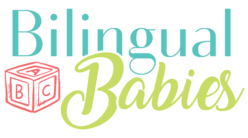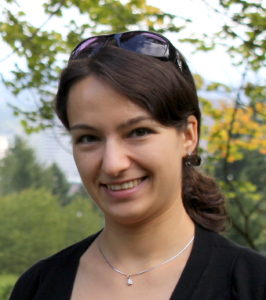Dr. Tanya Sydorenko is a professor of applied linguistics at Portland State University where she teaches classes about second language acquisition. Tanya is also the mother of two children, a boy (8 years) and a girl (14 months) with whom she mainly speaks her mother tongue, Ukrainian. Around the time when her daughter was born, Tanya’s son gradually stopped speaking Ukrainian—a development that could be related to several aspects.
Mom: Ukrainian, Russian, English
Dad: Malay, Hokkien, English
Son (8 years): English, Ukrainian
Daughter (14 months): pre-language
Veronika:
Thank you so much for taking the time for this interview.
It’s exciting.
Veronika:
My first question is about your family. Could you describe the language situation in your home: who speaks what to whom?
Four languages under one roof: Ukrainian, Hokkien, Malay, and English
Tanya:
Well, my husband is from Malaysia. Together we speak English, that’s our common language. English is I would say his third language, but he is fluent in it because he studied and spoke it from a very young age. As for me, I speak Ukrainian and Russian. I speak Ukrainian to my kids. Well, let me amend that and say, I used to speak it to my son, and now he wants to switch to English most of the time. So, it seems that now I speak mostly English with my son. But with my younger daughter, I still speak Ukrainian most of the time. There might be a couple of words I sometimes say in English, but for the most part, it is Ukrainian. And then my husband, he’s very interested in languages. He picked up a few phrases here and there so he will use a couple of phrases in Ukrainian as well, but he usually does it for the sort of fun aspects of it.
Veronika:
What languages does your husband speak? You said the third language is English.
Tanya:
He speaks Hokkien, which is a dialect of Chinese and Malay, which is the national language. He’s ethnically Chinese, so in the family, they always spoke Hokkien as a primary language and English. But when I asked him to teach me how to say certain things, he would always ask me, “Well, do you want it in Malay or Hokkien?” And then I noticed that they mix the three languages all the time.
Veronika:
Does he speak one of those languages to the children?
Tanya:
Early on, with my son, he would say a couple of phrases here and there. He wasn’t really speaking one of those languages, he would just say a couple of things occasionally. He’s not a linguist, and so I think he just expected my son to know exactly what it means just from a few phrases. And so, my husband just said, “Let’s not waste time.” He’ll still sometimes do it. He likes to annoy my son sometimes. Sometimes he will speak English to him with a Malay accent. When they speak English in Malaysia, they speak with an accent, but also they will modify certain grammatical features a little bit, so he sometimes switches to that just to see what my son’s reaction will be, and my son will immediately say, “I have no idea what you’re talking about”, even though I think it’s quite clear. He’ll react to the modified variety in that way.
Veronika:
That’s interesting. And how old are your kids now?
Tanya:
My son is eight, and my daughter is 14 months old.
Veronika:
Is she already starting to speak?
Tanya:
She says a few words here and there, but not very much. Mostly, it’s “Hmm.” That’s her main and favorite word at the moment. We always know what it means in context… it totally makes sense.
Choosing Ukrainian with keywords in English
Veronika:
How did you approach the different languages with your son and your daughter?
Tanya:
 Well, with my son, I wanted him to know Ukrainian. So from the very beginning, I spoke Ukrainian. Especially before he went to daycare, he was home with me for a few months. Back then, it was Ukrainian all the time, except when my husband came home from work. So in the evenings, when he was around, I spoke a little bit of English and a little bit of Ukrainian, both. I don’t think I completely switched to English when my husband was around in the evenings. So that’s how I approached it with my son. I tried to provide the minority language as much as possible.
Well, with my son, I wanted him to know Ukrainian. So from the very beginning, I spoke Ukrainian. Especially before he went to daycare, he was home with me for a few months. Back then, it was Ukrainian all the time, except when my husband came home from work. So in the evenings, when he was around, I spoke a little bit of English and a little bit of Ukrainian, both. I don’t think I completely switched to English when my husband was around in the evenings. So that’s how I approached it with my son. I tried to provide the minority language as much as possible.
With my daughter, I’m trying to do the same. I’m trying to speak as much Ukrainian as I can. The only thing that is quite peculiar, which I find peculiar because I’m a linguist, and this really doesn’t make sense to me as a linguist, but as a human, I felt that for some reason, I need to say some of the keywords in English. So, when speaking Ukrainian, I sometimes translated a few of the words that I felt were keywords into English. I would say something in both languages with the mindset that the kids will go to an English-speaking school, and to make it easier for them, they should know a little bit of English to begin with, when they go to daycare, and then when they go to school. Again, as a linguist, I don’t think that makes sense to me because I know that the transition shouldn’t be too difficult for children. But somehow, as a parent, as a human, I feel I need to help them out. It could be… that I feel I need to set them up for… I don’t know, not success, but just for comfort, I guess.
Veronika:
Interesting. So how does your son’s journey continue? Is he fully bilingual now?
Language attrition: Gradually losing the Ukrainian language
Tanya:
Let me backtrack a little. There have been quite a few changes over the years. He was fully bilingual. But over the past year, it seems that he lost the Ukrainian. He can’t even say one word in Ukrainian anymore, even though when I ask him to translate something from Ukrainian into English, he can do it without a problem. I don’t know how the switch happened so fast. Like I said, in the last maybe half a year or so, he seemed to have lost the ability to speak Ukrainian. Let me give an example. When my parents visit from Ukraine, they always stay with us. Sometimes for several months. So my son has always had exposure to more Ukrainian by talking to his grandparents a lot. But again, recently something changed and he wouldn’t say anything in Ukrainian anymore. So yesterday, he was talking to my mom completely in English. And my mom said, “I don’t understand. Can you try it in Ukrainian?” He got so frustrated that he said “How can you not understand me?” He clearly struggled and was just unable to say a word in Ukrainian. He just kept saying the same thing in English really fast. It’s interesting for me to observe how quickly the switch happened from him being bilingual last year to English only now.
Veronika:
So, up until last year, he would also speak Ukrainian?
Tanya:
With my parents, yes. Well, with my mom. My dad speaks English better than my mom, so he kind of figured that out. “Hey, I can speak English with grandpa, but grandma definitely needs me to speak Ukrainian.” And this year I don’t think he doesn’t want to do it; he really just feels like he can’t anymore. He cannot find his words anymore.
What caused the language attrition?
Veronika:
Did he enter a new school or a new class?
Tanya:
 No, but my sister said, “Well, maybe he’s just trying not to be different from other kids.” Maybe that’s what’s happening. Really, I have no idea.
No, but my sister said, “Well, maybe he’s just trying not to be different from other kids.” Maybe that’s what’s happening. Really, I have no idea.
Veronika:
I was thinking ‘new school’ because I had a similar experience with Ella (5). She just started kindergarten in September. She always speaks German to me and I am very meticulous about reinforcing that at home. One morning, though, when I dropped her off at school and she jumped out of the car, I noticed that she said “Bye, mom!” instead of “Tschüss.” before she walked into the building. First, I didn’t think much of it. But then I noticed that she would always say goodbye in English when teachers and other students were around. Even the “Hab dich lieb” which is usually answered by “Ich dich auch, Mama!” only got smiles or an English “Love you too”. So, one day I called her out on it. I asked her, “Ella, what’s the deal here? We always speak German. Why do you say goodbye in English when I drop you off? Are you ashamed of German?” She’s quickly said, “No, I’m not ashamed of German. But they don’t need to know I speak German.” At first, I didn’t quite know what to make of it . It did not start on the first day at the new school either. It happened at the end of September, so between mid-August and the end of September she was saying goodbye in German, and then all of a sudden the switch to English. So a few weeks later at the parent-teacher conference, I brought up the issue with Ella’s teacher. I told her that I had noticed a refusal to speak German around the school, even though she’s always been pretty proud of her German heritage. And I asked the teacher if there was anything that happened at school, whether Ella got ridiculed or just didn’t want to stand out. And then the teacher said “Oh, yeah, you’re right. In the beginning, she came to me and taught me these German words and that has stopped. Now that you’re mentioning it, she doesn’t do that anymore.”
The teacher then invited me to come to class and talk about the German Saint Nicholas Day. So, I did that. I talked about Saint Nicholas Day, which is a big holiday for children in Germany, and the teacher has reinforced German a little and, funny enough, two weeks later, she switched to “Tschüss, Mama,” again.
Tanya:
She just needed some encouragement that it’s okay.
Veronika:
Yeah, I think so. I think she just needed some confirmation that it’s okay to speak German. But then, your situation may be different if your son hasn’t transferred into a new school.
Tanya:
I think for our context, I just have so many things going on that very often… So about a year ago, when the switch began, my son was still speaking quite a bit of Ukrainian with his grandparents but not so much with me. I spoke Ukrainian to him, but he would reply back in English. Then, I tried a couple more times speaking back in Ukrainian, but then I would just give up. I think it’s because mentally I have so many other things going on that I just thought, well… I don’t have the energy. I also feel that me not pushing it probably contributed to the rapid switch that he has made. And then another thing, as I said, early on I spoke mostly Ukrainian with him with a few English keywords here and there, and my parents were doing the same. I can’t figure out if I picked it up from my parents who were doing it with the kids, or if they picked it up for me, or if we both kind of “organically decided” to do it, that is, to mix the two languages in this way.
Eventually, as my son started getting more of a vocabulary, I started noticing, “Wait a minute, I don’t know how to mix the two languages?” Ukrainian, for instance, has case endings with gender agreement and all sorts of grammatical features like that. And I caught myself thinking, “Wait, what sort of ending should I put on this English word?” Because without an ending it didn’t sound natural. So, I kept noticing as we were mixing languages, that it was new territory for me. I had never mixed the two languages like that. So, I felt that my son really wasn’t getting enough vocabulary in Ukrainian because there was a lot of switching to these English keywords. I wonder if at some point it just became too difficult to converse because of mixing the two languages in the way we did. I don’t know, maybe that’s another thing that contributed to not really sticking with Ukrainian.
A new sibling may change the language dynamic
Veronika:
 Could be if the code switching or code mixing doesn’t feel natural. But you also said that you have a 14 months old daughter. So was the switch happening or starting around the birth of your daughter?
Could be if the code switching or code mixing doesn’t feel natural. But you also said that you have a 14 months old daughter. So was the switch happening or starting around the birth of your daughter?
Tanya:
Yes.
Veronika:
I’m wondering if that contributed to it as well. You said that you spoke only Ukrainian when your son was little and gradually increased the amount of English as he got older. Also, among the adults, you and your husband, you speak English. Maybe your son though that the language that you speak with a baby is Ukrainian, and he feels that he is more grown up now?
Tanya:
Yeah, maybe there’s something to it, and now he’s all grown up. I don’t know. I don’t think it’s about being jealous. He’s very happy that he has a sister. He can’t really play with her much, but otherwise, he’s very sweet with her. So, it’s probably not the jealousy aspect but maybe he is thinking it’s a baby language. That’s totally possible.
Books, TV and shows as ways to provide exposure to the minority language
Veronika:
To go back to the exposure aspect, what have you done to expose your son to Ukrainian other than talking to him?
Tanya:
Not much. TV is in English. We have some books in Ukrainian. Early on, we read Ukrainian stories to him and he really enjoyed them. Two or three years ago, he was really into languages. I think at that point, he was really into Max and Ruby videos. We had a book about that and we found some videos that he would watch about that story. But I feel like as he was getting older, there was more on the iPad, and whatever was on the iPad was always in English. And now, he’s really into all things technology. He’s into Pokémon. Personally, I have no idea how to talk about Pokémon in Ukrainian. I have absolutely no vocabulary on that topic. [laughs] I also feel that his interests diverge from mine, and I am not going to invest in learning how to talk about that in Ukrainian. So, that’s also maybe another contributing factor.
Veronika:
It will be interesting how your daughter takes to the minority language.
Tanya:
 Yeah, definitely. Yeah. My hope is to be a little bit more intentional with her in terms of Ukrainian, but we’ll see what happens. I think it’s also the sibling factor that may come into play at some point…. Since my son has already switched to English, we’ll see what the family dynamic will look like. If he doesn’t understand Ukrainian anymore and I speak Ukrainian to her… I don’t know what will happen and how that may affect relationships and dynamics in our family. I’m just happy that he at least still understands a lot of the Ukrainian words. We still have that for now.
Yeah, definitely. Yeah. My hope is to be a little bit more intentional with her in terms of Ukrainian, but we’ll see what happens. I think it’s also the sibling factor that may come into play at some point…. Since my son has already switched to English, we’ll see what the family dynamic will look like. If he doesn’t understand Ukrainian anymore and I speak Ukrainian to her… I don’t know what will happen and how that may affect relationships and dynamics in our family. I’m just happy that he at least still understands a lot of the Ukrainian words. We still have that for now.
Veronika:
That is already a lot if he has listening comprehension skills in Ukrainian! I wish I had that… [laughs] But, yeah, each child is unique and siblings can be so different. We’ll see how they develop. With my second one, Alex, I’m noticing that he takes a lot longer to speak than Ella did. By the time she was 14 months, she was already saying words, and he’s still mainly at the babbling stage.
Seeing how what you know from research plays out in real life
Tanya:
 Well, with my son I am also curious to see if there will be a difference because I remember being a little bit worried because he wasn’t speaking much early on. But then, all of a sudden, he just took off. Originally, I thought probably because of two languages it took him a little bit longer to figure things out. But then, at one point he just took off. I even use this example in my second language acquisition class when we read about dynamic systems theory. There’s a case study by Robinson and Mervis (1998) in which they looked at one child’s language development over a period of 13 months. They found a nearly perfect negative relation between vocabulary growth and plural use. That is, they found this “inverted trend” where when the children stopped picking up new vocabulary or saying new vocabulary items, they advanced in their usage of grammatical features and vice versa. I actually noticed that very same pattern in my son. I remember for two or three weeks, I didn’t hear any new words from him, and I got a little worried. And then, all of a sudden, he started using these perfect case endings in Ukrainian, and it was just amazing to see such a big shift. So I always tell my students, “Look, this is not just a study. As a mother, I witnessed the exact same thing.” Research and experience…combined it’s just sort of…
Well, with my son I am also curious to see if there will be a difference because I remember being a little bit worried because he wasn’t speaking much early on. But then, all of a sudden, he just took off. Originally, I thought probably because of two languages it took him a little bit longer to figure things out. But then, at one point he just took off. I even use this example in my second language acquisition class when we read about dynamic systems theory. There’s a case study by Robinson and Mervis (1998) in which they looked at one child’s language development over a period of 13 months. They found a nearly perfect negative relation between vocabulary growth and plural use. That is, they found this “inverted trend” where when the children stopped picking up new vocabulary or saying new vocabulary items, they advanced in their usage of grammatical features and vice versa. I actually noticed that very same pattern in my son. I remember for two or three weeks, I didn’t hear any new words from him, and I got a little worried. And then, all of a sudden, he started using these perfect case endings in Ukrainian, and it was just amazing to see such a big shift. So I always tell my students, “Look, this is not just a study. As a mother, I witnessed the exact same thing.” Research and experience…combined it’s just sort of…
Veronika:
…it’s very powerful, isn’t it?! It’s amazing to see the connection, to witness the things you know from research papers in real life. So, are you planning to teach your son to write Ukrainian?
Taking children’s preferences into account when guiding them through their bilingual journey
Tanya:
I was, but I don’t think I’m going to go there now that he doesn’t even speak it anymore. That was my initial goal though. In Ukraine, and in Russia, they used a book called Bukvar, which teaches you about the alphabet and early reading. Because Russian and Ukrainian are both phonetic languages… so there is a direct correspondence between the sounds and the way you spell things. So, this book teaches you very quickly how to go from learning the alphabet to reading short syllables. We have those, and maybe when he was two years old, he already knew most of the English letters, and I thought, “Oh, wow, he’s definitely going to be reading in Ukrainian and English anytime now.” But no, he actually is not a strong reader now, and I wonder if that’s because of the way his brain works. It’s very engineer like. He wants a very straight answer to every question. So, in English when you have so many exceptions to the rules, he gets frustrated. I wonder maybe if I started him reading in Ukrainian, which is very straightforward, maybe it would be easier for him.
Veronika:
Yes, maybe…
Tanya:
Yeah. It’s very systematic. Once you get it, you get it. You can read any word after that. When he was very little, he seemed like he was really into patterns, In fact, he’s still into patterns and anything systematic.
Veronika:
It might be worth a try.
Tanya:
Yeah, if he agrees.
Veronika:
Yes, if he agrees.
Tanya:
I may have to pay him. [laughs] Stickers used to be the currency, and now…
Veronika:
…it’s getting more expensive, huh?
Tanya:
That’s right. [laughs]
Veronika:
[laughs] So, final question: What advice would you give to other parents who would either like to raise their children bilingually or are already doing that?
Having listening comprehension skills is a huge achievement
Tanya:
Oh, gosh, I don’t know if I’m the best person to give advice because I feel like as a linguist, I failed.
Veronika:
 I don’t think you did. He understands Ukrainian. That’s huge!
I don’t think you did. He understands Ukrainian. That’s huge!
Advice from a linguist and mom: be consistent in your approach and use opportunities for exposure
Tanya:
I don’t know, It’s hard for me to give advice. I feel like sometimes I’m a little too easy. I’ve always wanted to be a strict parent, and then somehow that just disappears. I think I’m strict in some aspects and not so much in others. Maybe if I put my foot down more, if I’m more consistent and determined… as you described. You went to Ella’s school, you talked to the teacher, you figured out what’s happening, and found a way to help bring her confidence back to speak German, that sort of thing. I like that. I didn’t do that. Maybe that would be good advice for other parents to be determined and find ways to get the children more interested, more confident in using another language.
Also making use of opportunities like classes in the minority language would be great. Well, I have a lot of friends who are from Ukraine but speak Russian. For me, when I speak Russian to them, it’s perfectly fine, but I just can’t speak Russian to my children because, in the family, we always spoke Ukrainian. So that’s my home language. Now, when I interact with my friends, who speak Russian, and their kids speak Russian, my son feels left out, or felt left out when he was still speaking Ukrainian. He didn’t feel like he understood a lot of Russian. And my friend’s children would go to extracurricular activities, where things were in Russian such as Russian dance classes etc. I never signed him up for that because, again, it wasn’t really our language in the family to begin with. So, maybe if there were activities in Ukrainian, I think I would have signed him up for those. But we just don’t have them around here. I know there are language schools, there’s a Japanese school around us… So, my advice is…if you have access to activities that use the minority language make use of it. It is probably a big advantage because then you’re not the only person who speaks that language, especially as the only parent who speaks that language.
Veronika:
Yes, it helps to show children that the minority language is not just a special code mom or dad speak. It’s something an entire community speaks. They are not alone on their little bilingual journey, there are others in the same boat.
Tanya:
Exactly.
Never forget: give yourself a break sometimes …
Well, that was a really interesting interview. Thank you very much! I know there are many other parents out there who have too much to juggle on a daily basis. Plus, there’s this idea that if the children speak both or more languages fluently, you’re doing a perfect job. But I seriously think, regardless of whether the children are fluent, have listening comprehension, or an awareness of the other language or languages, it’s an asset to the children.
…because as parents we are all human and at times juggle too much!
Tanya:
A little bit is better than none.
Veronika:
That’s right! And it has to work with the personal or the family situation.
Tanya:
Agreed!
References:
Robinson, B. & Mervis, C. (1998). Disentangling early language development: Modeling lexical and grammatical acquisition using and extension of case-study methodology. Developmental Psychology, 34, 363–375.



